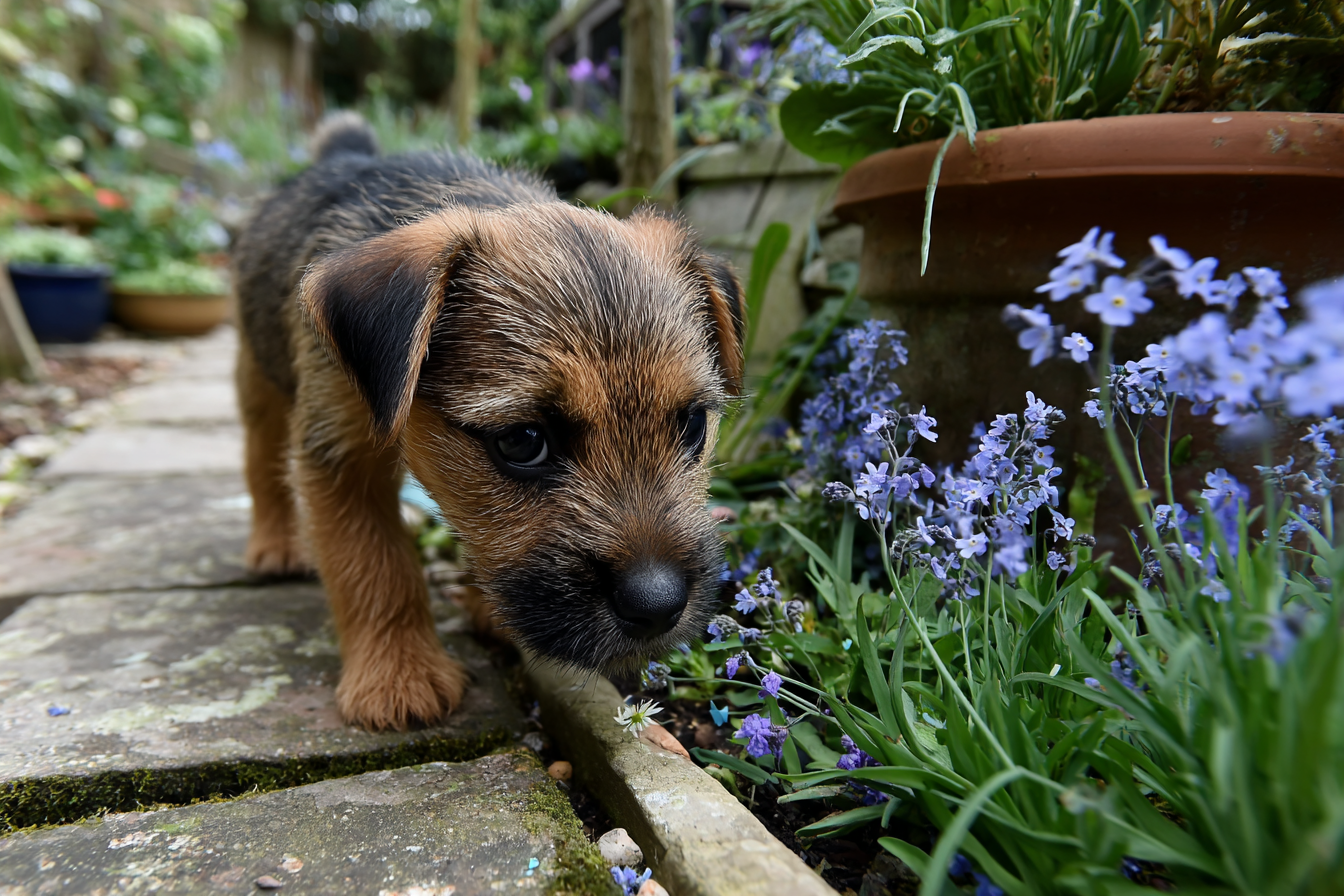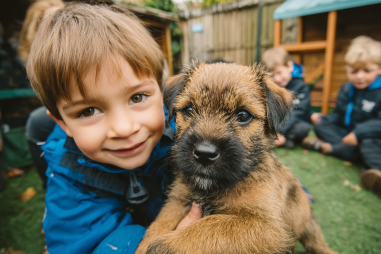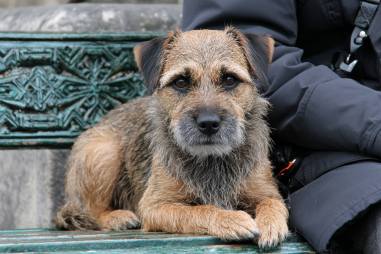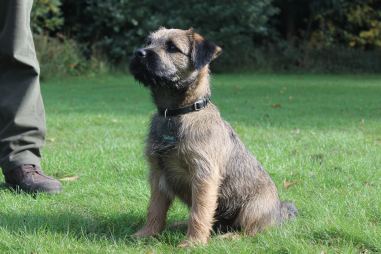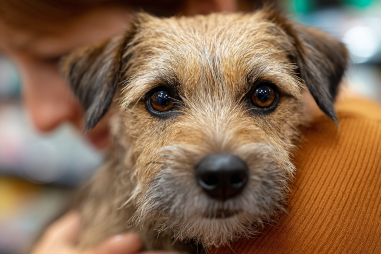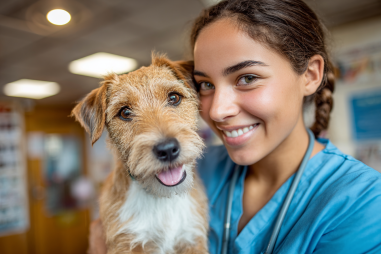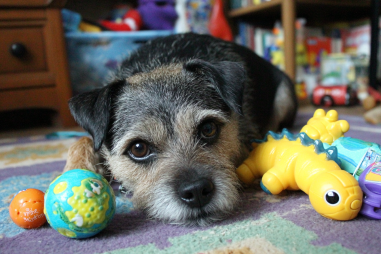Welcoming a Border Terrier puppy into your home is a joyful experience filled with excitement and lots of new responsibilities. These spirited little dogs are known for their affectionate nature, intelligence, and boundless energy. To ensure your puppy grows into a happy, healthy, and well-behaved companion, proper care from the very start is essential. This comprehensive guide covers everything you need to know about Border Terrier puppy care, from preparing your home to building a lasting bond.
Preparing Your Home for a Border Terrier Puppy
Before bringing your Border Terrier puppy home, it’s important to create a safe, welcoming space tailored to their needs. These energetic pups require plenty of room to explore, play, and rest.
Start by designating a quiet area where your puppy can retreat for naps and downtime. A cozy crate with comfortable bedding works well and also aids in house training. Make sure this space is free from hazards such as electrical cords or small objects your puppy could swallow.
Next, set up a feeding spot with bowls for food and water that are the right size for your puppy. It’s advisable to use stainless steel or ceramic bowls, as they are more hygienic and durable than plastic ones.
Finally, gather essential supplies such as chew toys, puppy-safe grooming tools, a collar and leash, and puppy pads or training aids. Border Terriers love to chew, so having appropriate toys will help prevent destructive behavior and keep your puppy entertained.
Nutrition and Feeding Tips for Puppies
Proper nutrition is the foundation for your Border Terrier puppy’s growth and development. Selecting a high-quality puppy food formulated specifically for small breeds is important. These formulas typically contain the right balance of protein, fats, vitamins, and minerals to support strong bones, muscle development, and healthy skin and coat.
Feed your puppy multiple small meals throughout the day rather than one or two large ones. Usually, 3 to 4 meals daily work best for young puppies, gradually decreasing to two meals as they mature.
Always provide fresh water and monitor your puppy’s eating habits. Be cautious with treats and avoid giving human foods that could be toxic, such as chocolate, grapes, onions, or anything with xylitol.
Vaccination and Vet Care Schedule
Your Border Terrier puppy will need a series of vaccinations to protect against common contagious diseases like parvovirus, distemper, and rabies. It’s important to establish a relationship with a trusted veterinarian who can guide you through this schedule.
Typical vaccination timing is as follows:
- 6-8 weeks: First round of vaccinations including distemper, adenovirus, and parvovirus.
- 10-12 weeks: Booster vaccinations and additional protection like Bordetella (kennel cough).
- 14-16 weeks: Final booster doses and rabies vaccine (required by law in many areas).
Besides vaccines, your vet will also provide deworming medications, flea and tick prevention, and a microchip if desired. Regular checkups will ensure your puppy grows healthy and quickly identify any issues early.
Early Socialization and Training Basics
Border Terriers are intelligent and eager to please, making early socialization and positive training crucial. Introducing your puppy to a variety of people, pets, sounds, and environments from a young age will help prevent fear or aggression later on.
Enroll in a puppy socialization class or organize safe playdates with vaccinated dogs to encourage healthy interactions.
Training should begin immediately using positive reinforcement techniques such as praise, treats, and gentle corrections. Start with basic commands like “sit,” “stay,” and “come.” Consistency and patience are key. Avoid harsh discipline as Border Terriers respond best to kindness and encouragement.
Puppy-Proofing Your Environment
Border Terrier puppies are naturally curious diggers and chewers, so puppy-proofing is essential to keep them safe and protect your belongings.
Here are some tips to puppy-proof your home:
- Remove or secure electrical cords and outlets.
- Keep small objects, chemicals, and plants out of reach.
- Use baby gates to restrict access to dangerous areas.
- Store shoes, clothing, and valuables in closets or cabinets.
- Secure trash cans with lids or keep them inside cupboards.
Supervise your puppy closely during playtime and walks, and redirect unwanted chewing to appropriate toys. A well-protected environment promotes well-being and quickens training progress.
Common Puppy Health Concerns
While Border Terriers are generally robust, it’s important to be aware of some health issues that may arise during puppyhood.
- Parasites: Puppies are prone to worms and fleas, so timely vaccination and preventive treatments are necessary.
- Hypoglycemia: Small breed puppies can experience low blood sugar if not fed regularly, causing lethargy or seizures.
- Infections: Upper respiratory infections or ear infections can develop, especially if your puppy is stressed or exposed to sick animals.
- Genetic conditions: Some Border Terriers may face hip dysplasia or skin allergies, so monitor your puppy’s behavior and coat condition closely.
Consult your veterinarian promptly if you notice any signs of illness such as vomiting, diarrhea, excessive scratching, or changes in appetite or energy.
Building a Lasting Bond with Your Puppy
Creating a loving and trusting relationship with your Border Terrier puppy sets the stage for a lifetime of companionship. Spend quality time playing, training, and simply cuddling with your puppy every day.
Engage in interactive activities like fetch, puzzle toys, and gentle grooming sessions. These moments strengthen your connection and provide mental stimulation.
Always respect your puppy’s needs for rest and comfort, and be patient as they navigate the learning curve of puppyhood.
Remember, a Border Terrier thrives on attention and affection, so shower your furry friend with love, and your bond will grow stronger with each passing day.
With proper preparation, nutrition, healthcare, training, and plenty of love, your Border Terrier puppy will flourish into a loyal, playful, and well-adjusted adult dog. Embrace the journey of puppy care and enjoy every joyful moment with your new best friend.

